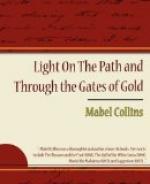II
There is no doubt that a man must educate himself to perceive that which is beyond matter, just as he must educate himself to perceive that which is in matter. Every one knows that the early life of a child is one long process of adjustment, of learning to understand the use of the senses with regard to their special provinces, and of practice in the exercise of difficult, complex, yet imperfect organs entirely in reference to the perception of the world of matter. The child is in earnest and works on without hesitation if he means to live. Some infants born into the light of earth shrink from it, and refuse to attack the immense task which is before them, and which must be accomplished in order to make life in matter possible. These go back to the ranks of the unborn; we see them lay down their manifold instrument, the body, and fade into sleep. So it is with the great crowd of humanity when it has triumphed and conquered and enjoyed in the world of matter. The individuals in that crowd, which seems so powerful and confident in its familiar demesne, are infants in the presence of the immaterial universe. And we see them, on all sides, daily and hourly, refusing to enter it, sinking back into the ranks of the dwellers in physical life, clinging to the consciousnesses they have experienced and understand. The intellectual rejection of all purely spiritual knowledge is the most marked indication of this indolence, of which thinkers of every standing are certainly guilty.
That the initial effort is a heavy one is evident, and it is clearly a question of strength, as well as of willing activity. But there is no way of acquiring this strength, or of using it when acquired, except by the exercise of the will. It is vain to expect to be born into great possessions. In the kingdom of life there is no heredity except from the man’s own past. He has to accumulate that which is his. This is evident to any observer of life who uses his eyes without blinding them by prejudice; and even when prejudice is present, it is impossible for a man of sense not to perceive the fact. It is from this that we get the doctrine of punishment and salvation, either lasting through great ages after death, or eternal. This doctrine is a narrow and unintelligent mode of stating the fact in Nature that what a man sows that shall he reap. Swedenborg’s great mind saw the fact so clearly that he hardened it into a finality in reference to this particular existence, his prejudices making it impossible for him to perceive the possibility of new action when there is no longer the sensuous world to act in. He was too dogmatic for scientific observation, and would not see that, as the spring follows the autumn, and the day the night, so birth must follow death. He went very near the threshold of the Gates of Gold, and passed beyond mere intellectualism, only to pause at a point but one step farther.




